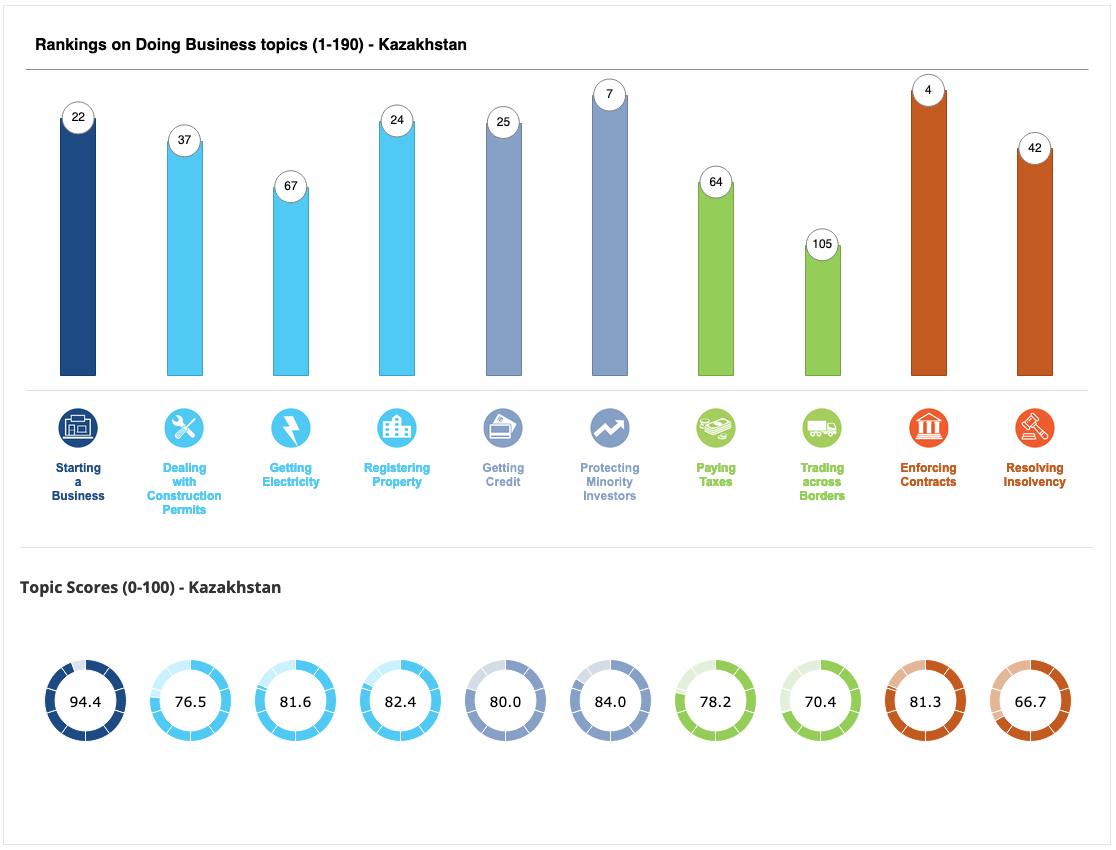Since declaring independence in 1991, Kazakhstan has implemented a series of reforms – often in cooperation with renowned organisations such as the OECD, the World Bank, and the American Bar Association — to liberalise its economy, improve its legal system, and attract foreign investment.
Rule of Law in Kazakhstan
In 2015, President Nazarbayev launched a new programme of five institutional reforms, naming the promotion economic growth and ensuring rule of law as two of the main priorities. The success of these programmes is confirmed by the increasing number and value of foreign direct investments in Kazakhstan and the decreasing number of investor-state disputes.
Kazakhstan has the largest economy in Central Asia and ranks 25th in the World Bank’s 2020 Ease of Doing Business Index, ahead of many developed countries such as Japan, Spain, France, Israel, and Switzerland. In the same ranking, Kazakhstan was recognised as the 4th best country in the world for contract enforcement, the 7th best for protecting minority investors, and the 22nd best place for starting a new business. In addition, the 2021 Index of Economic Freedom has Kazakhstan ranked as 34th in the world, with an overall increase of 1.5 points in the last year. Kazakhstan’s high scores are a testament to the country’s total commitment to facilitating business, abiding by the rule of law, and upholding international obligations towards foreign investors.


Kazakhstan’s dedication to the rule of law has secured USAID funding for a Kazakhstan Rule of Law programme intended to run through 2020-2025, aimed at supporting improvements in the investment and business climate, legal system, and judiciary. Kazakhstan is also a signatory to and participant in the European Union/Council of Europe’s Central Asia Rule of Law programme (2020-2023), which seeks to reinforce human rights, the rule of law and democracy in accordance with European and other international standards.
To mark the 30th anniversary of Kazakhstan’s independence in December 2021, US Congressmen Jackie Walorski, Robert Aderholt, and Steve Chabot paid tribute to the past 30 years of productive US-Kazakhstan bilateral relations and praised the country’s reforms. The Congressmen commended the Republic of Kazakhstan for focusing “significant resources on rule of law issues” and diligently working “to establish a hospitable business and investment climate for foreign investors”.
In line with its commitment to nurturing a strong rule of law, Kazakhstan strives to ensure that domestic and foreign investors are treated fairly. In 2017, Kazakhstan established of a Court and Arbitration Centre operating under English common law, part of the newly created Astana International Financial Centre (AIFC). As noted by the UK Government, the AIFC court is independent of the Kazakh judicial system and its judgements cannot be appealed in the Kazakh judicial system.
Furthermore, Kazakhstan also has a very positive record when it comes to resolving International Arbitration investment disputes. As stated by the Secretary General of the International Centre for Settlement of Investment Disputes (“ICSID”), at the event organised by the World Bank on 27 May 2021, of the 19 concluded investment arbitrations that have been brought against Kazakhstan since it obtained independence in 1991, Kazakhstan has either prevailed (10 cases), settled pre-award (2 cases), or promptly settled all awards post-annulment proceedings (6 cases). Kazakhstan has only ever chosen to contest one arbitration case – the Stati case – which it rightly argues should be overturned on the basis of the Stati’s criminal conduct before, during, and after the ECT Arbitration.



